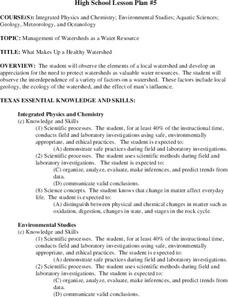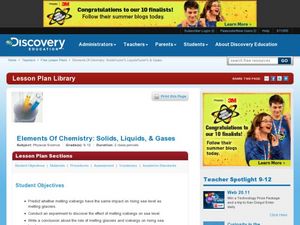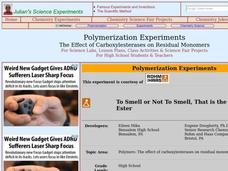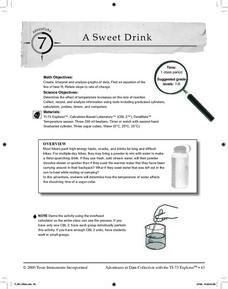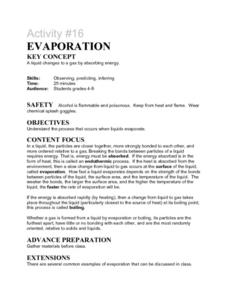Curated OER
Candy Cane Chemistry
Fourth graders, in groups, examine the effect of heat on bonding forces by doing laboratory work.
Curated OER
Construction of a Microscale Fuel Cell
Fuel cells are being called the "energy source" of the future. Allow your high school chemistry class to construct a miscroscale fuel cell, complete with all components to generate energy. This engaging activity will allow them to apply...
American Chemical Society
Density: Sink and Float for Solids
Steal cubes sink, but steal ships float. Lesson explores the density of solids as well as the density of water in determining what will sink and what will float. A hands-on group activity helps pupils see that weight and volume are two...
Cornell University
Forensic Science: Case of the Missing Diamond Maker
Someone stole a diamond-making machine. Who done it? Scholars use forensic science at six different stations to determine the culprit. They analyze fingerprints, use their senses, and complete chemistry experiments to determine the...
University of Georgia
Endothermic and Exothermic Reactions
Equip your chemistry class with the tools to properly understand endothermic and exothermic reactions. Young chemists collect, analyze, and graph data to determine how the Law of Conservation of Matter is applied to chemical composition...
Santa Monica College
Introducing Measurements in the Laboratory
We use basic units of measurement to break down things and communicate clearly. The first lesson in an 11-part series teaches the proper way to measure various items. It starts simply with measuring the dimensions and areas of geometric...
Curated OER
Graphing and Analysis of Water Quality Reports
Students practice making graphs and interpreting them. They compare and contrast different sets of data. They use Microsoft Excel to create different types of graphs.
Curated OER
What Makes Up a Healthy Watershed
Students, after observing the elements of a local watershed, explore the need to protect watersheds as water resources for the future. They examine the factors involved with a watershed: geology, ecology, and the effect of man's...
Curated OER
Elements of Chemistry: Solids, Liquids and Gases
Young scholars predict if icebergs melting has an effect on the sea level rising. In this global warming lesson students complete an experiment to see the effects of melting icebergs and write a conclusion on their data collected.
Curated OER
Descending to the Challenge: Developing Documentaries About the Deep Ocean
The video clip that comprises the warm up is not available, but the related article from The New York Times and the movie trailer for Aliens of the Deep are, leaving enough material to make this a fascinating lesson on deep-sea...
American Chemical Society
Production of a Gas - Controlling a Chemical Reaction
Though the publisher designated this unit for use with third through eighth grades, this particular lesson would be best used with middle schoolers due to the specific measurement skills required. Basically, they set up the reaction...
American Chemical Society
Controlling the Amount of Products in a Chemical Reaction
Everyone enjoys combining baking soda and water. Here is a lesson that challenges scholars to analyze the reaction three different ways — the real substances, the chemical equation, and the molecular models. Class members experiment to...
Curated OER
Ice
Students examine the different propereties of ice, such as freezing temperature. In this scientific lesson students complete several activities using ice, like making ice cream.
NOAA
It's a Roughy Life
Scientists recently discovered several previously unknown species at the Bear Seamount off the coast of New England. Scholars research these new species — benthopelagic, benthic, and seamount fish — and find out what makes them unique....
Curated OER
Exothermic Rehydration of Gypsum
Learners observe exothermic reactions in the lab using plaster. In this chemistry lesson, students collect data from their experimental set up every five minutes. They explain the different stages in the hardening of plaster.
Curated OER
Acid-Base Titrations without Burets
Students analyze the level of acid and base in a titration. In this chemistry activity, students investigate the amount of acid and base required to create certain household chemicals. They perform this activity without the use of burets.
Curated OER
Rusting-A Form of Oxidation
Students observe the rusting process in the lab. In this chemistry lesson, students rank metals according to their conductivity. They give real world applications of this activity.
Curated OER
Polymerization Experiments
Students explain the process of polymerization. For this chemistry lesson, students produce carboxylesterase in the lab. They test its effectiveness in removing the by-product odor.
Curated OER
Separation of Unknowns in a Liquid
Learners identify the different components of a given sample using chromatography. In this chemistry lesson, students compare paper and column chromatography. They collect data and construct data tables.
Beyond Benign
Enthalpy of Combustion
Learn the facts about types of wax! Partnered pupils determine the enthalpy of combustion for traditional paraffin candles, as well as soy-based candles. The activity focuses on calculations and compares the environmental impact of both...
Curated OER
A Sweet Drink
Students investigate reaction rates. In this seventh or eighth grade mathematics lesson, students collect, record, and analyze data regarding how the temperature of water affects the dissolving time of a sugar cube. Studetns determin...
Curated OER
Science: Testing Water for Toxicity
Students investigate the potential toxicity of water samples using California blackworms to test water quality. They observe the worms' behaviors in different water samples and determine which sample has the highest toxicity. At the...
Curated OER
Evaporation of Alcohol and Water
Students investigate the process that occurs when liquids evaporaate. They test water and alcohol to determine which substance evaporates more quickly and relate the rate to energy changes.
Virginia Department of Education
Mystery Iron Ions
Young chemists perform an experiment to determine if a compound is iron (II) chloride or iron (III) chloride. Then they determine the formula, balance the equation, and answer analysis questions.
Other popular searches
- Water Chemistry
- Lake Water Chemistry
- Water Chemistry Ions
- Co2 Water Chemistry
- Water Chemistry Lesson Plans
- Ocean Water Chemistry
- Basic Water Chemistry
- Water Chemistry Properties
- Storm Water Chemistry
- Marine Water Chemistry
- Size vs. Water Chemistry
- Water Chemistry Nitrate









